Highlights from the 2017 Annual Meeting
More than 2,500 law school faculty, deans, and staff attended the 111th Annual Meeting of the Association of American Law Schools from January 3-7, 2017, in San Francisco. The event is the largest worldwide gathering of law deans, faculty, and staff and featured over 1,000 speakers at more than 250 sessions covering a wide range of legal topics.
The meeting’s theme, set last year by AALS President Kellye Y. Testy (Dean, University of Washington School of Law), was “Why Law Matters.” “We need to make the case now for why law matters and the academy’s role in advancing respect for and understanding of the rule of law,” she stated in her address at the 2016 AALS Annual Meeting announcing the theme.
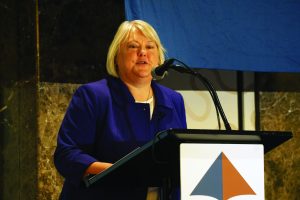
2016 AALS President Kellye Testy.
In accordance with that theme a number of sessions at the Annual Meeting addressed the surprising results of the 2016 U.S. Presidential election and possible effects the incoming administration will have on issues of interest to law schools and the legal profession today.
Several sessions held early on
Wednesday morning addressed these issues specifically, including the “AALS President’s Program on Diversity.” One of many timely sessions arranged by President Testy through the AALS President’s Programs, this panel featured a group of legal educators selected from a call for papers who discussed the challenges and benefits of diversifying law school students. The panel included Moderator Blake Morant (Dean, George Washington University Law), Carla Pratt (Penn St. Law), Eboni Nelson (University of South Carolina), Robert Vischer (Dean, University of St. Thomas Law), Arlene Kanter (Syracuse Law), Carol Goforth (University of Arkansas Law), Erin Dallinger-Lain (Drake Law), Jody David Armour (University of Southern California Law), Lawrence Alexander (San Diego Law), and Maimon Schwarzschild (San Diego Law).
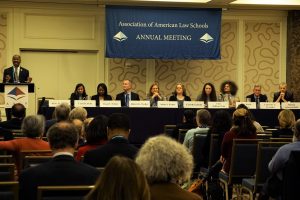
AALS President’s Program on Diversity panelists. From left to right: Moderator Blake Morant, Carla Pratt, Eboni Nelson, Robert Vischer, Arlene Kanter, Carol Goforth, Erin Dallinger-Lain, Jody David Armour, Lawrence Alexander, and Maimon Schwarzschild.
Wednesday night’s Opening Reception held in the Exhibit Hall gave attendees the chance to take in the exhibitor booths and connect with sponsors while allowing space for informal networking and sharing ideas among attendees.
The AALS House of Representatives met twice during the course of the Annual Meeting, and successfully elected Wendy Perdue, (Richmond Law) as President-Elect and Erwin Chemerinsky (UC Irvine Law) and Camille A. Nelson (American University Washington College of Law) as new members of the AALS Executive Committee.
The Executive Committee bid farewell to outgoing members Blake D. Morant (George Washington Law), Devon W. Carbado (UCLA Law), and Vicki Jackson (Harvard Law).
President Testy gave her
Presidential Report on 2016 during the first meeting of the House of Representatives, stating “This year has made me even more confident in the future of our legal academy. I stand in admiration of the way our law schools are responding to a very challenging environment and responding to the type of help that our world desperately needs and craves.”
2017 AALS President Paul Marcus (William & Mary Law School) gave his
inaugural address at the second House of Representatives meeting, saying “In the recent addresses by AALS Presidents, we have heard of the great challenges and changes legal educators are facing… and over the course of the next year, while I will surely look to such matters, I wish to focus on something related, yet different. I plan to encourage all of us in legal education to promote the notion of equal access to justice.”
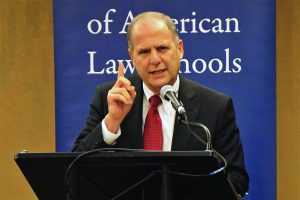
Paul Marcus gives his Presidential Address at the Second Meeting of the AALS House of Representatives.
Professor Marcus announced that the theme of his presidency and of the 2018 Annual Meeting will be “Access to Justice.”
“Our efforts as legal educators in attempting to assure this ideal is a story truly worth telling,” said Professor Marcus. “I intend to tell our story to our colleagues, our students, and to judges, lawyers, and the broader community. It is quite some story.”
Thursday morning kicked off with the presentations of the annual
Scholarly Papers contest, awarded to Christopher Walker, Associate Professor of Law at Ohio State Law for his paper, “Legislating in the Shadows.” Honorable Mention was given to Mila Sohoni (San Diego Law) for her paper, “Crackdowns.”
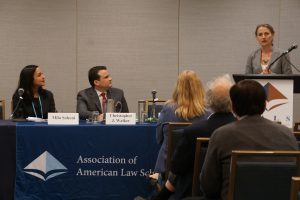
2017 Scholarly Papers Award Winner Christopher Walker, Ohio State Law, and Honorable Mention Mila Sohoni, San Diego Law, at the presentation.
The conference’s plenary program on Thursday featured a new perspective on legal education from Brad Smith, President and Chief Legal Officer of Microsoft, Inc., who gave a talk on “
Preparing a Diverse Profession to Serve a Diverse World.”
Smith brought his unique perspective as a tech executive to a threefold approach to interests shared with the legal profession: first, what is happening to the law in an era of technological and global change; second, what this means for legal practice; and third, what this means for the role of law schools and the role of lawyers in the United States. “This is a critical time for the law,” he said, “and therefore it is a vital time for the nation’s law schools.”
Smith was joined in the latter half of the plenary session by Lucy Lee Helm (Executive Vice President, General Counsel, and Secretary of Starbucks Coffee Company), Kellye Testy, and Dan Rodriguez (Northwestern Pritzker Law) for a panel discussion on the diversifying legal profession. They discussed the necessity of adjusting legal education to match the facts of the modern legal profession: a professional reality in which not every law school graduate gains employment in law practice and not every law career looks the same.
In addition, the
2016 Teachers of the Year were announced at the start of the plenary session.
The President’s Program “Great Expectations: The Competences, Skills, and Attributes that Employers Seek in our Graduates” later on Thursday brought the day’s theme full circle by discussing new data from “Foundations for Practice,” a study by the Institute for the Advancement of the American Legal System (IAALS). The IAALS project is a first-of-its-kind survey designed to discover the qualities that real-world employers seek in law school graduates. Panelists included Alli Gerkman from IAALS, Guillermo Mayer from Public Advocates, and Frederick Rivera from Perkins Coie LLC. The session was moderated by AALS President Kellye Y. Testy.
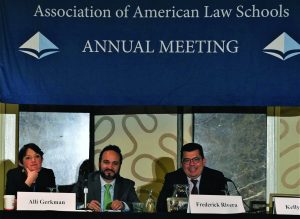
Panelists at the President’s Program “Great Expectations: The Competences, Skills, and Attributes that Employers Seek in our Graduates.” From left to right: Alli Gerkman from the Institute for the Advancement of the American Legal System, Guillermo Mayer from Public Advocates, and Frederick Rivera from Perkins Coie LLC.
The final President’s Program on Thursday was “Why Law Matters: The 2017 U.S. Presidential Transition.” The spirited discussion ranged from Constitutional safeguards challenged by the incoming administration to the wide range of unprecedented changes the American rule of law may face during the Trump presidency. Panelists included Steven Calabresi (Northwestern Law), Erwin Chemerinsky (UC Irvine Law), Luz Herrera (Texas A&M Law), Moderator Martha Minow (Harvard Law), James Forman Jr. (Yale Law), and Rachel Moran (UCLA Law).
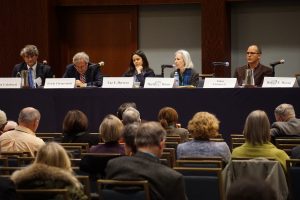
Panelists at the AALS President’s Program “Why Law Matters: The 2017 U.S. Presidential Transition.” From left to right: Steven Calabresi, Erwin Chemerinsky, Luz Herrera, Moderator Martha Minow, and James Forman Jr.
included the cross-cutting program “Leveraging the Rise of Law in Popular Culture,” an Institutional Advancement session that featured Dean Strang, the defense attorney made famous by the Netflix docuseries Making a Murderer. Strang was also the guest of honor at the Institutional Advancement reception, where he gave a talk on “Systemic Justice and the Law School Curriculum.”
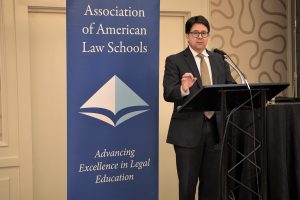
Dean Strang (defense attorney in the Netflix docuseries “Making a Murderer”) gives a talk on Systemic Justice and the Law School Curriculum at the Institutional Advancement reception.
The Annual Meeting hosted a variety of hot topic programs throughout the conference, aimed at discussing current and pressing issues in the legal world and in American society. These included freedom of the press under President Trump, sustainability disclosure in relation to recent Securities and Exchange Commission guidance, declining rates of passing bar exam scores, federal power over immigration, the future of reproductive rights and justice, and a current lawsuit that may be the new face of the climate change fight.
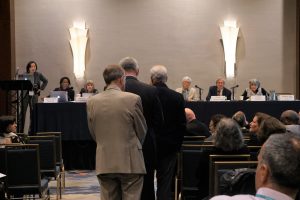
Audience members line up to pose questions during the discussion portion of the Hot Topic program on bar exam scores and new ABA pass standards.
The 101 AALS Sections created the majority of the programming at the Annual Meeting, with topics and sessions appealing to various subjects and perspectives on the law.
For the second year, AALS included arc of career programs designed to address the professional development needs of law school faculty members at every stage of their career. These included sessions on post-tenure career paths, blogging, considering a deanship, post-tenure reflections from clinical professors, and preparing to transition to life beyond the academy.
The 111th Annual Meeting wrapped up on
Saturday with a Symposium at which all attendees were invited to consider “Why the Decline of Law and Legal Education Matters (And What We Might Do About It?).”
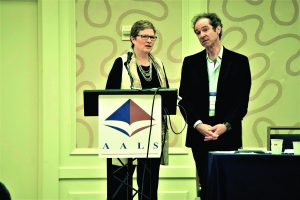
Robin West and Pierre Schlag during the AALS Symposium: “Why the Decline of Law and Legal Education Matters (And What We Might Do About It?)”
Planning is already in progress for the
2018 Annual Meeting, January 3-6 in San Diego, California. We hope to see you there!
Many thanks to the Program Committee for the 2017 Annual Meeting:
- Donna Nagy, Indiana University Maurer School of Law, Chair
- Ben Barros, University of Toledo College of Law
- George W. Dent, Jr., Case Western Reserve University School of Law
- Rachel Moran, University of California, Los Angeles School of Law
- Hilary Sale, Washington University in St. Louis School of Law








